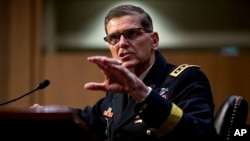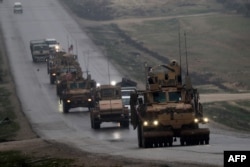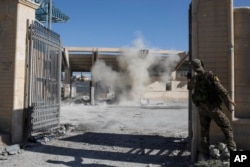The commanding general of U.S. forces in the Middle East was not told before President Donald Trump initially declared victory over the Islamic State terror group and announced his decision to withdraw troops from Syria.
"I was not aware of the specific announcement," Gen. Joseph Votel told U.S. lawmakers Tuesday of the president's announcement this past December.
"I was not consulted," he added.
Since the announcement, Pentagon officials have confirmed some equipment has been moved out of Syria. Other preparations to pull some 2,000 U.S. troops out of Syria also have been ongoing.
But there has been little clarity as to how and when U.S. forces will ultimately leave, while questions abound about whether the pullout would give Islamic State militants an opportunity to regain strength and retake territory.
"We are going to do that in a very deliberate manner," Votel said. "I am not under pressure to be out by a specific date and I've not had any specific conditions put upon me."
He said that means finding ways to withdraw without giving the terror group any openings.
"We do have to keep pressure on this network," Votel said. "They have the capability of coming back together if we don't."
The warning follows others by top defense and intelligence officials in recent days, including a report released Monday by the Pentagon's internal watchdog.
"Absent sustained [counterterrorism] pressure, ISIS could likely resurge in Syria within six to 12 months and regain limited territory," the report said, using an acronym for the group.
It further warned IS still commands "a battle-hardened and well-disciplined force ... able to coordinate offensives and counter-offensives."
Slow, steady progress
Votel told lawmakers Tuesday that, for now, U.S. partner forces are making slow but steady progress against the last sliver of the terror group's self-declared caliphate, roughly 50 square kilometers in Syria's Middle Euphrates River Valley.
"That fight is progressing as we envisioned it," he said of the final push against an estimated 1,000 to 1,500 fighters.
"It's very dense, urban terrain," Votel said "The area is laden with extreme explosive hazards."
Still, Votel said he expects the U.S.-backed Syrian Democratic Forces will liberate the remaining territory before the last U.S. troops leave the country.
Unanswered questions
The head of U.S. Central Command also said the United States is working with partners and allies to make sure that even then, IS will not able to stage a comeback.
But officials continue to warn that may prove difficult.
U.S. defense and intelligence agencies estimate the terror group still has anywhere from 20,000 to 30,000 fighters and supporters dispersed across Syria and Iraq, some of them already carrying out attacks as part of a growing insurgency.
U.S. officials also believe morale among IS fighters remains high despite losing more than 99 percent of the territory it once controlled.
And there are questions as to whether the U.S.-backed Syrian fighters will be capable of maintaining pressure on IS without the presence of U.S. forces and with the possible loss of support from Kurdish fighters.
Kurdish commanders have warned they may have to abandon the fight against IS in order to defend against Turkish forces which might attack once U.S. troops leave.
Turkey considers many of the Kurdish fighters to be linked to the PKK, a terrorist group which has been waging a decades-long insurgency in southeastern Turkey.
"We are going to consider things like protection of our partners, the Kurds," Votel told lawmakers of the U.S. withdrawal. "We are going to consider the concerns that Turkey has."







